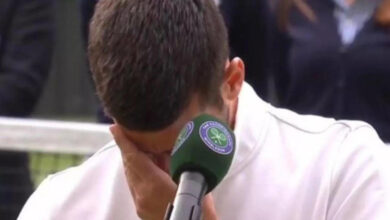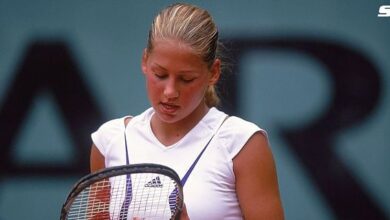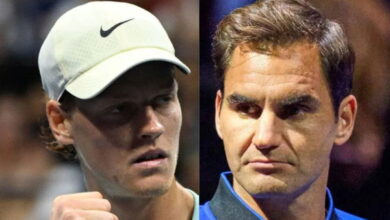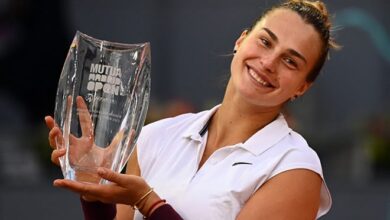Aryna Sabalenka Steps Into the Spotlight With U.S. Open Win
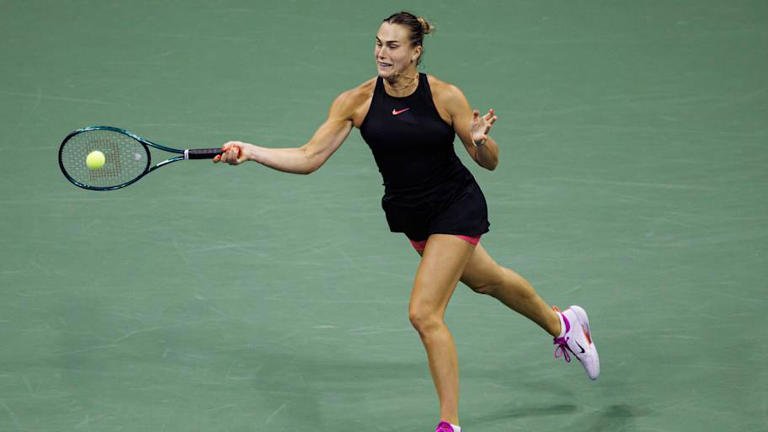
Why is she not a bigger star?
I was discussing this with an agent last week. Sure, she was a late bloomer in a way that Serena or Sharapova or even Iga Świątek was not. And, sure, until January, she had “only” won one major. I totally disagree with this point (see below, and this point is nullified by Sharapova’s appeal) but I know many fans take issue with her grunting.
But the agent and I also wondered what Sabalenka’s profile might look like, were she not from Belarus, an autocratic country with rigged elections, support of the moral rot that is Vladimir Putin and abridged liberties. (Note this freedom score.) This is also a country with a per capita income of less than $10,000.
Inevitably, discussions on these lines trigger the Team Whatabout and the other moral relativists. But it is disingenuous to deny that, in tennis, nationality impacts star wattage. Naomi Osaka and Kei Nishikori can capitalize on their nation’s wealth and commercial opportunities, in a way Sabalenka cannot. Zheng Qinwen can capitalize on China’s size and scale in a way Sabalenka cannot. Serena Williams, Coco Gauff and Tayor Fritz can capitalize on American media and marketing muscle, in a way Sabalenka cannot. Players from, say, Germany or Denmark or Canada rise to prominence and suddenly WTA events pop up in those countries. Suffice it to say, that you will not find tournaments and exhibitions being staged in Belarus.
Again, none of this is to blame Sabalenka. She is fantastic and thoroughly deserving of her personal popularity. But it is hard to deny that her global “superstardom” —which I take largely to mean earning power—is undermined by her country of origin.
Hi Jon
Some additional parting thoughts …
51. For the second year in a row some tennis fans had to watch the women’s final with the TV muted. Is it just the fans that have an issue with Sabalenka’s constant (and varying) grunts, or have players also mentioned it?
As always, thanks for your coverage.
Duane W.
• I proposed this new rule: the players in the draw who hit the biggest shots get a waiver on grunting. I was joking. But not joking. When grunting is a byproduct of effort and exertion—and it usually is, certainly in Sabalenka’s case—I give the player a pass. I know that many of you disagree and the soundtrack erodes your enjoyment. But honestly, I barely notice it.
Want to go at breaches of sportsmanship? How about bathroom breaks, having nothing to do with bladders? How about attire in the exact shade of yellow that matches that of the ball? How about declining to concede a point you know you did not rightfully win? How about rifling a ball into the stands?
1) Some parts of players’ facilities should be private (i.e. Świątek on the training table after a loss); 2) Nick Kyrgios’s online behavior is unacceptable and should not be rewarded with another analyst gig. But not holding my breath given tennis’ ability to turn a blind eye …
@socraticobserver
• A) I feel a bit sheepish saying this as a media member, but I agree. We are hardwired to seek/request/demand more access, not less. But surely a player should be able to have a post-match emotional offload without getting caught on video.
Often the players are aware of the cameras. When they exit their card and walk through the gates. When they stretch. But you wonder if they realize the full extent of the operation.
B) Online. On-site. Inside the locker room. Inside green rooms. In private and in public. The condemnation of Kyrgios was nearly universal. There wasn’t the usual polarization or stanning or cries of “snowflake” or groping for a double standard.
It’s quite simple: You cannot express something so misogynistic and suggestive and sensationally inappropriate about anyone—never mind about a colleague/player and her boyfriend whom you might cover in your new career; never mind that you pleaded guilty just last year to assaulting an ex-girlfriend—and not expect consequence. ESPN’s next event is the Australian Open. Stay tuned to see who makes the roster and who gets cut.
Hi Jon, WTHIGOW Canadian tennis. All of the top Canadians lost handily in the first round (albeit a pleasantly surprising run from Gabriel Diallo … who??). Given the age and injury patterns of Bianca Andreescu/Leylah Fernandez/Denis Shapovalov/Félix Auger-Aliassime, is this the end of the so-called Canadian tennis renaissance? Like Swedish tennis, have we burned brightly and are destined for many years of drought. Give me some objective perspective—there’s only so much hockey I can watch!
Neil Grammer, Toronto
• It’s a reminder that these kinds of sample sizes are small and it doesn’t take much to turn a country’s fortunes. The other day on air, I praised Belarus (population 10 million) for furnishing five hard court major titles in the last dozen years. But we are only talking about two players, Victoria Azarenka and Sabalenka.
Similarly, it was a rough event for Canada. But we are only talking about four players. Auger-Aliassime and Shapovalov, both of whose careers appear to have stalled out; Andreescu, to whom tennis karma owes much; and Fernandez, who is an admirable player but one vulnerable to a slugging opponent.
Also let’s name-check Diallo, a 6’8” former Kentucky Wildcat who left the chrysalis stage and reached the middle weekend.
